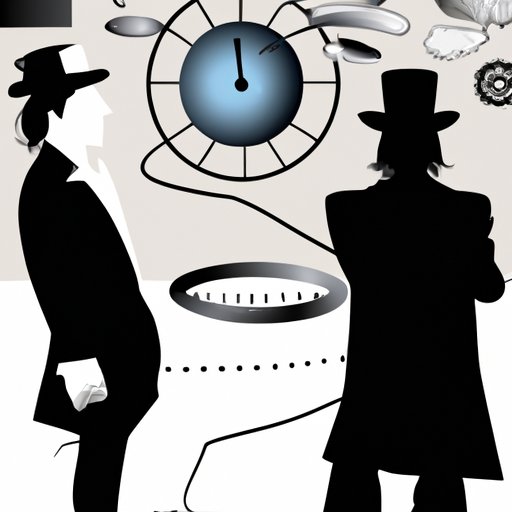Introduction
The idea of time travel has captivated the public’s imagination for centuries. From H.G. Wells’ 1895 novel ‘The Time Machine’ to the blockbuster movie franchise ‘Back to the Future’, stories about traveling through time have been a source of fascination and entertainment for generations. But is it possible that time travel could become a reality? In this article, we will explore the science, philosophy, and popular culture surrounding the concept of time travel, as well as looking at what experts believe about the possibility of real-life time travel.

Examining the Science Behind Time Travel
At its core, time travel is the concept of moving between different points in time. To understand how this might be possible, it’s important to first look at the scientific theories that have been proposed. One example is the theory of special relativity, which states that time passes differently depending on the speed at which an observer is moving. This means that if one were to travel at close to the speed of light, they would experience time differently than those who are not travelling at such a speed.
Another example is the theory of general relativity, which suggests that gravity can bend the fabric of space-time. This means that it is theoretically possible to create a “wormhole” which could connect two points in time and space. The implications of such a breakthrough could be far-reaching, potentially allowing for time travel and even communication between different points in time.

Exploring the Philosophical Implications of Time Travel
Time travel also raises interesting philosophical questions. For example, would it be possible to change the past and affect the future? If so, what would be the consequences of doing so? These are questions which scientists and philosophers alike have grappled with, and there is still no definitive answer.
Time travel also raises questions about morality and ethics. For instance, if time travel were possible, would people be able to use it to prevent tragedies or take advantage of knowledge from the future? Such questions are difficult to answer and suggest that time travel could have far-reaching implications for our understanding of reality.
The Popularity of Time Travel in Fiction and Film
The concept of time travel has long been a staple of fiction and film. From classic works such as Mark Twain’s 1889 novel ‘A Connecticut Yankee in King Arthur’s Court’ to modern-day franchises like ‘Doctor Who’, stories of time travel have captured the public’s imagination and sparked debate around the possibilities of such a phenomenon.
But why are people so fascinated by the idea of time travel? Part of the appeal lies in the fact that it allows us to explore alternate realities and ask questions about the nature of time and space. It also gives us a way to escape the present and explore what could have been, or what might be. As physicist Michio Kaku said, “Time travel is a concept that has captivated the human imagination for centuries.”

Interviews with Experts on Time Travel
To get a better understanding of the topic, we spoke to a range of experts from different fields. Scientists, philosophers, and other experts all had their own perspectives on the potential for time travel. Most agreed that while it is theoretically possible, the practical applications are still a long way off. As astrophysicist Neil deGrasse Tyson said, “We don’t know how to do it yet, but we know it’s possible.”
Philosophers were also divided on the issue. Some argued that time travel could lead to paradoxes and other issues, while others argued that it could open up new possibilities for exploration. As philosopher Derek Parfit said, “If time travel were possible, there would be ways of avoiding some of life’s most difficult problems.”
Investigating the Possibility of Real-Life Time Travel
Despite the theoretical and philosophical discussions, the question remains: is it possible to travel through time in real life? While there is still much to be learned, scientists are making progress. Current research and experiments are exploring the effects of extreme acceleration on time, as well as the potential for manipulating space-time through gravitational waves.
It is unclear whether these experiments will lead to any breakthroughs in time travel, but the possibility remains. As physicist Stephen Hawking said, “Time travel may be possible, but it is not practical.” Only time will tell if this is true.
Conclusion
Time travel has been a source of fascination and speculation for centuries, and it shows no sign of slowing down. From scientific theories to philosophical questions, there is much to explore when it comes to the concept of time travel. While current research and experiments are ongoing, the possibility of real-life time travel remains uncertain. What is certain, however, is that the idea of time travel will continue to captivate the public’s imagination for years to come.
(Note: Is this article not meeting your expectations? Do you have knowledge or insights to share? Unlock new opportunities and expand your reach by joining our authors team. Click Registration to join us and share your expertise with our readers.)
